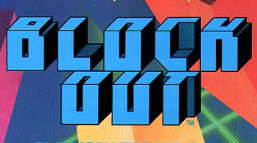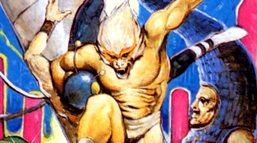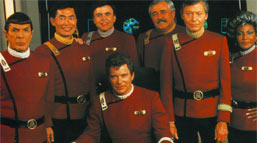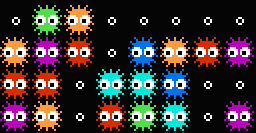Hard Drivin'
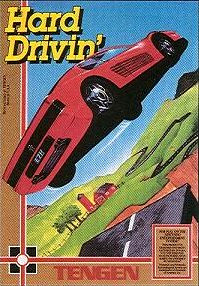 I first met Mark Morris -- a veteran programmer of video games and photo apps and everything in-between -- back in 2009. Mark had come across a post I'd written about the unreleased version of Atari's Hard Drivin' he'd programmed for the NES long ago. We talked a bit and, it turned out, we both found ourselves recent transplants to the San Francisco Bay Area, so we met up at a local pub and became fast friends.
I first met Mark Morris -- a veteran programmer of video games and photo apps and everything in-between -- back in 2009. Mark had come across a post I'd written about the unreleased version of Atari's Hard Drivin' he'd programmed for the NES long ago. We talked a bit and, it turned out, we both found ourselves recent transplants to the San Francisco Bay Area, so we met up at a local pub and became fast friends.
In a way, that chance meeting re-energized us both. I was working in video game publishing at a job I couldn't stand, and Mark had been out of games for years, wondering what was next and if anyone would ever remember his work; a lot of it, after all, had never shipped, Hard Drivin' included.
I'd like to think that in me, Mark found someone who respected his work enough to actually bring him back to that time and regain the pride he once felt for it, giving him the drive to start something new. He's even making games again.
But for me, Mark was proof that what I'd set out to do with Lost Levels was working. Our goal when we launched this site exactly ten years ago today was to not just preserve unreleased and undocumented games, but to let the world know that these games matter, that there is value to be found in even the most obscure, unpublished work, and that some of us really do care about this stuff and want to make sure it's safe.
So on Lost Levels' tenth anniversary, I could think of no better celebration than to give Mark a call to discuss his work on Hard Drivin', the atmosphere at "unlicensed" publisher Tengen during a tumultuous time spent mainly in courtrooms with Nintendo and, yes, to provide a digital download of the game so that people can finally give it a shot. We still do that sometimes. Be gentle, this is a very early demo of the game; a lot of features hadn't been implemented yet, and because of the scanline-level trickery Mark employed, the game doesn't run correctly in any current emulator.
I was looking through my emails, and it was a little over four years ago that you found me and sent me a message saying how honored you were to come across my post. Do you remember that?
I do remember that. I think I was in the process of updating my resume. I was looking for any mention of any of my previous work that I could link to. So that's how I found Lost Levels.
That's probably the only thing you found about Hard Drivin' on the NES at all.
Yeah, absolutely. Everybody had scattered to the winds long ago, so I was surprised to find anything. But there it was.
You were working for Domark at the time you made Hard Drivin', back in 1988.
Yes. I was living in London. I had finished Roadblasters for the NES in Australia, and then I moved to London so I could work with Tengen. There was some work visa issues at the time. But I was a British citizen, so I was able to go into England and work as a sub-contractor through Domark to keep working with Tengen.
And Roadblasters, that was at Beam?
Yes, that was Beam Software, Nintendo's first Australian game house. One of the first outside of Japan to be a Famicom developer.
Remind me, as far as the Nintendo goes, Beam did what, Back to the Future, right?
Exactly, right. Back to the Future and a bunch of licenses mainly.
They kind of hit it big with a Lord of the Rings game on computers, right?
Right. That was before they became a Nintendo developer, they were the first game company to get a license from the Tolkein Estate to do a game. So they made a game for the Spectrum, I think, and the Commodore 64, The Hobbit. And that's about when I started working there, when they had just finished that.
Of all the games to put on this underpowered little box that was the NES, how did Hard Drivin' end up in your lap?
That came from Tengen. They had a list of titles that they had the clearance to do the home versions of, and that was one of them. I was surrounded by a lot of really talented people, so we thought that we could do it.
And like...I don't even know how to say this gently, were you crazy?
Absolutely! Yes! I was completely insane. I left high school as an assembly language programmer, and it took either some serious engineering ability or just insanity to be a game developer back then.
Do you remember how long you worked on the game?
I worked on [Tengen's also-unreleased] License to Kill when I was in England, and I worked on that for a while, and I worked on Hard Drivin'...I'm not exactly sure of the timing. There were a lot of flights to California. It was pretty crazy.
How do you even start putting a game this 3D-intensive on the NES? You mentioned to me when we first met four years ago that you had some help from the Atari ST version that Domark had done, right?
Absolutely. And one of the people I was referring to was a programmer, Jurgen Friedrich. He wrote the ST version, and was able to use the larger CPU to do the mathematical approach. So what we did was take the corner scenes and the loop scenes and made basically animated loops out of those. So when you went through the loop, it was a playback. And what I did using the technology that was in Roadblasters and a few other driving games, I applied what was at the time the traditional Nintendo driving game approach, which was to do it by scanline. The general part of the track was done using the scanline technique, and then when you encountered the features of the track, they were actually mini movies that were playing back.
So when I'm going through the loop, it kind of locks me in place, right? I can't go right and left, it's just showing me a slideshow?
No, you could scroll left and right. That was the groundbreaking interactivity that we brought to it [laughs]. So, you could fall off the loop. It had left and right dimensions that we could check against.
What do you remember about that time, if anything?
I remember being just in awe of Atari Games and Tengen. As someone growing up in an arcade, I loved Roadblasters in particular. It was just such an honor to be around those guys. Games have always been a multi-disciplinary approach, but most of the time you're not really dealing with hardware guys anymore. But back then, they got hardware and software and art and music and all of the licensing. There were all of these moving parts that had to get together to make a game, and it was just great to be around.
The game was never in a finished state, right? It was abandoned prior to being completed.
The higher-ups at Tengen didn't think it was of publishable quality.
Ah.
And the things that we needed to do involved putting more expensive hardware on the cartridge, which just wasn't sustainable. Tengen was already having trouble with Tetris and all of that. So all that was going on as well when I was working with those guys, so it was a pretty interesting time.
The game, if I'm not mistaken, was at least shown off at a Consumer Electronics Show, right?
Yeah, CES in Vegas, but...things get kind of blurry from the Vegas airport onward [laughs].
I guess the reason I ask was because it doesn't seem like Tengen saw Hard Drivin' as this internal experiment that they had no solid plans of publishing. This is a game that was advertised really heavily. If you look back through the magazines of the time and you see the game featured prominently in a two-page spread. You look at mailorder lists in the backs of the magazines and, well, it wouldn't have worked if you'd tried, but you could place orders for the game. So it seemed to be they at least had intent of releasing this game.
There were enormous lead times back then. Magazine space and things like that were booked months in advance. And one of the great things about Tengen was they weren't married to these allocation deadlines that Nintendo had where if you didn't submit your game by the end of the quarter, you'd have to wait until the end of the next quarter to submit it. A lot of sleepless nights were created because of that situation. Tengen didn't have that, but even without that arbitrary deadline, there were still enormous lead times with advertising and things like that. It was planned months in advance. And it was this commodities bet that they'd make it! They had to pay for the manufacturing of the cartridges.
Yeah, I mean, you had to really take a gamble with these things and know how many to order in advance, and if the game flopped you were screwed, and if the game did great and you ran out of stock it would take forever to get more copies on shelves...at least, if you were a Nintendo licensee.
Right, but because Tengen did its own manufacturing, they were in a better position to do all that stuff. But the lead times kind of hit the turbulence going on underneath, I think there was a lot going on with Atari and Time-Warner and Nintendo. It was a very turbulent time. So I am certain I don't have the full story of this situation.
So the project gets abandoned, but you do hold onto a cartridge of the game, a prototype cartridge, that makes its way with you when you move to America. Was there a specific reason you kept it with you? Were you particularly close to the game, or did you just happen to have it, or what?
I have copies of all the games that I've worked on. So that came with me as part of my collection. And again, that was back in the old days when your game was a physical thing that you had to carry with you. So yeah, I moved to London to New York to here to all over the place carrying these games with me, because it was my resume basically. So yeah, I kept it close.
You kept it for personal reasons, but did you ever think that anybody else would ever care about Hard Drivin'?
I did not. I put it away, and life went on. That's why I emailed you to begin with because it was like, aw, man! We really put a lot of our lives into those games, so it was great that somebody did care and appreciated almost every pixel of effort that we put into these games. It's really quite heartening.
So recently after you dug this cart out, you came into my office and we booted up the game...probably for the first time since the late 80s for you, right?
Yeah, yeah. I don't think I looked at it after moving onto the enormous heights of career success of [the also unreleased] Penn & Teller's Smoke and Mirrors and all the other games [laughs]. Hard Drivin' was long forgotten!
Looking at it now...how do you think you did?
To this day, my Nintendo work is the work that I'm the most proud of. We really had no choice but to get down to the hardware. There was no distractions of the internet or anything like that, it was just several horus a day every day of just sitting there writing in assembly language.
Do you miss it, in a weird way?
Back then the layers on top of assembly weren't that thick. The valves of the computer now are lost under so much stuff, but back then we all drove a little closer to the hardware than we do now.
Cool, thanks for taking the time for this call Mark, sorry it was so last-minute.
Absolutely. Congratulations on the anniversary, man.
